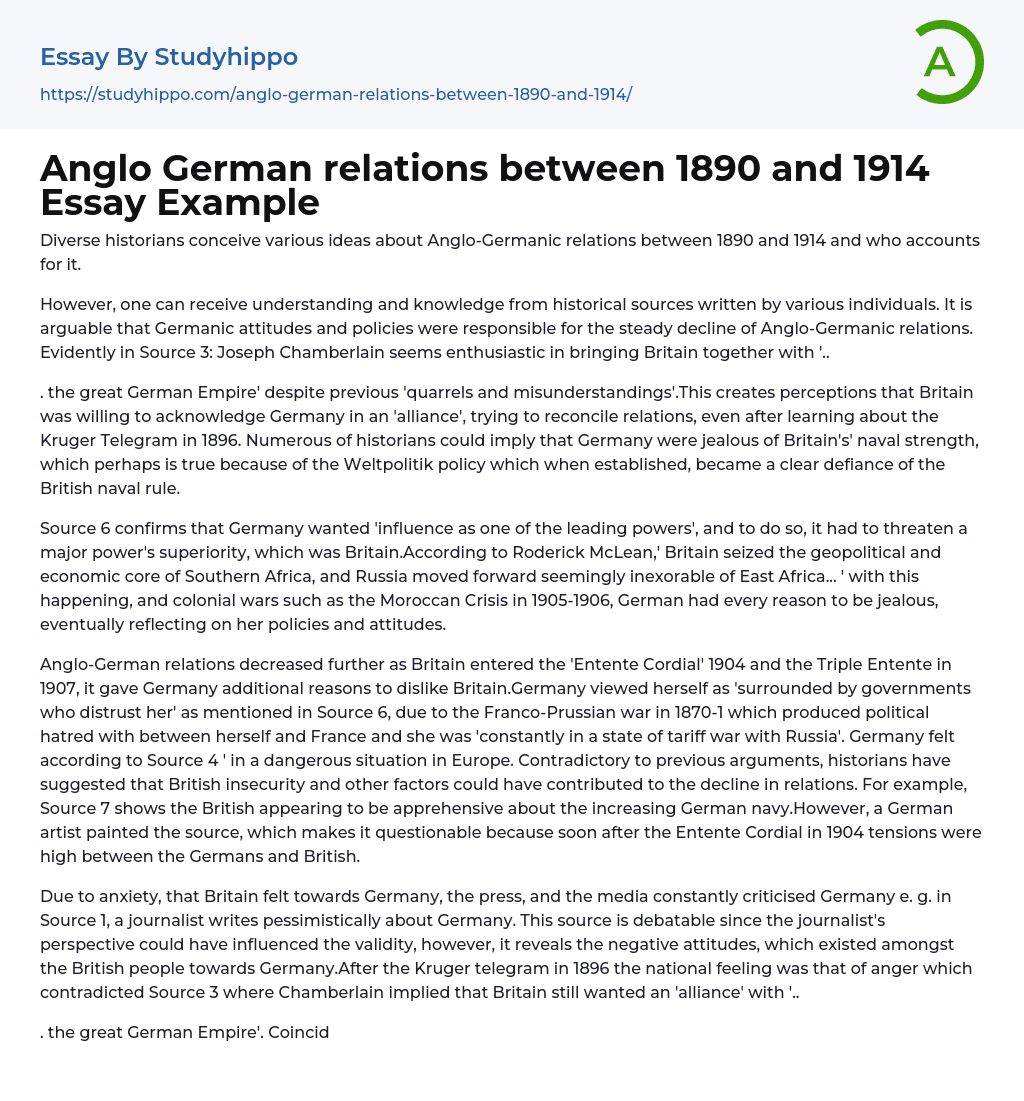

Anglo German relations between 1890 and 1914 Essay Example
Diverse historians conceive various ideas about Anglo-Germanic relations between 1890 and 1914 and who accounts for it.
However, one can receive understanding and knowledge from historical sources written by various individuals. It is arguable that Germanic attitudes and policies were responsible for the steady decline of Anglo-Germanic relations. Evidently in Source 3: Joseph Chamberlain seems enthusiastic in bringing Britain together with '..
. the great German Empire' despite previous 'quarrels and misunderstandings'.This creates perceptions that Britain was willing to acknowledge Germany in an 'alliance', trying to reconcile relations, even after learning about the Kruger Telegram in 1896. Numerous of historians could imply that Germany were jealous of Britain's' naval strength, which perhaps is true because of the Weltpolitik policy which when established, became a clear defiance of the British naval rule.
> Source 6 confirms that Germany wanted 'influence as one of the leading powers', and to do so, it had to threaten a major power's superiority, which was Britain.According to Roderick McLean,' Britain seized the geopolitical and economic core of Southern Africa, and Russia moved forward seemingly inexorable of East Africa... ' with this happening, and colonial wars such as the Moroccan Crisis in 1905-1906, German had every reason to be jealous, eventually reflecting on her policies and attitudes.
Anglo-German relations decreased further as Britain entered the 'Entente Cordial' 1904 and the Triple Entente in 1907, it gave Germany additional reasons to dislike Britain.Germany viewed herself as 'surrounded by governments who distrust her' as mentioned in Source 6, due to the Franco-Prussian war in 1870-1 which produced political hatred with between herself and France and she was 'constantly in a state of tariff war with Russia'.
Germany felt according to Source 4 ' in a dangerous situation in Europe. Contradictory to previous arguments, historians have suggested that British insecurity and other factors could have contributed to the decline in relations. For example, Source 7 shows the British appearing to be apprehensive about the increasing German navy.However, a German artist painted the source, which makes it questionable because soon after the Entente Cordial in 1904 tensions were high between the Germans and British.
Due to anxiety, that Britain felt towards Germany, the press, and the media constantly criticised Germany e. g. in Source 1, a journalist writes pessimistically about Germany. This source is debatable since the journalist's perspective could have influenced the validity, however, it reveals the negative attitudes, which existed amongst the British people towards Germany.After the Kruger telegram in 1896 the national feeling was that of anger which contradicted Source 3 where Chamberlain implied that Britain still wanted an 'alliance' with '..
. the great German Empire'. Coincidentally this was spoken to a pro-German alliance group; additionally Chamberlain was pro-German making the source subjective. Many historians have concluded that beneath the scepticism laid fear and insecurity of Germany.
Source 2 seems to be highly cynical of Germany as the source seems to represent an anti-German rant, as it looks at Germany's industrial supremacy. ...
And the fateful mark will greet you at every turn', '... which your children maltreat in the nursery are made in Germany; nay the material of your favourite (patriotic) newspaper had the same birthplace as like as not'. This generates a feeling that Britain perhaps provoked certain falls in relations. As Britain emerged from 'Splendid Isolation' in
1898, it made 'overtures' to Germany, which was rejected, shattering hopes for a peaceful military alliance.
Source 6 relates Germany was seen to be 'threatening the independence of her neighbours and ultimately the existence of England', which illuminates British apprehension. These sentiments is observed in Source 5, which states 'Along with the deterioration between two countries the feeling of insecurity and fear of Germany had grown', and 'German fleet could be used as means of diplomatic pressure'.As Roderick McLean has questioned, 'How could she (Germany) assert her right to a place in the carve-up of the world unless she had a formidable fleet? This causes one to think about the situation before making a judgement about Germany's role in decline of relations. Historians believe that the extent in which decline was due to Germany solely is minimal. Most of the sources examined were based on personal perspectives, but one can derive from this that nobody was clear about the decline in relations, and who was responsible, so there will be no apparent answer.
To conclude the decline of relations is not blameable on one party as both parties had parts to play.
- Victorian Era essays
- Henry v essays
- Stonehenge essays
- 1920S essays
- 1950S essays
- 1960S essays
- 19Th Century essays
- 20Th Century essays
- Ancient Greece essays
- Bravery essays
- British Empire essays
- Civilization essays
- Colonialism essays
- Declaration of Independence essays
- Evidence essays
- Genocide essays
- Gilded Age essays
- Historical Figures essays
- Historiography essays
- History of the United States essays
- Letter from Birmingham Jail essays
- Louisiana Purchase essays
- Nazi Germany essays
- Rebellion essays
- Revolution essays
- Roman Empire essays
- Russian Empire essays
- The Columbian Exchange essays
- Vikings essays
- War essays
- What is History essays
- World History essays
- World Hunger essays
- African American essays
- African American Culture essays
- American Values essays
- Asian American essays
- Chinese essays
- Ethnicity essays
- Ethnocentrism essays
- German essays
- Han Chinese essays
- Hispanic essays
- Identity essays
- Korean essays
- Mexican essays
- Nation essays
- Native American essays
- Race and Ethnicity essays
- White People essays



